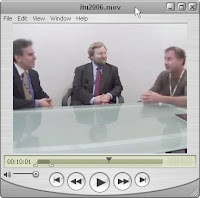The diminishing isolated populisms
This week on BlogTalkRadio I had the opportunity to interview John Battelle. You can read up on John or read his blog, Searchblog . He offered a good discussion on information availability, social networks and what he calls "conversational media". Here's where you can listen to our talk . John spoke on the show about how interconnected social groups were becoming. So, from a chapter called The Computer and the Counterculture in the book The Cult of Information by Theodore Roszak, I pulled this quote. I believe it describes a fundamental change in individual isolation which is very powerful as most of us imagine: "Both the quantity and content of available information is set by centralized institutions -- the press, TV, radio, news services, think-tanks, government agencies, schools and universities -- which are controlled by the same interests which control the rest of the economy. By keeping information flowing from the top down, they keep us isolated from each




